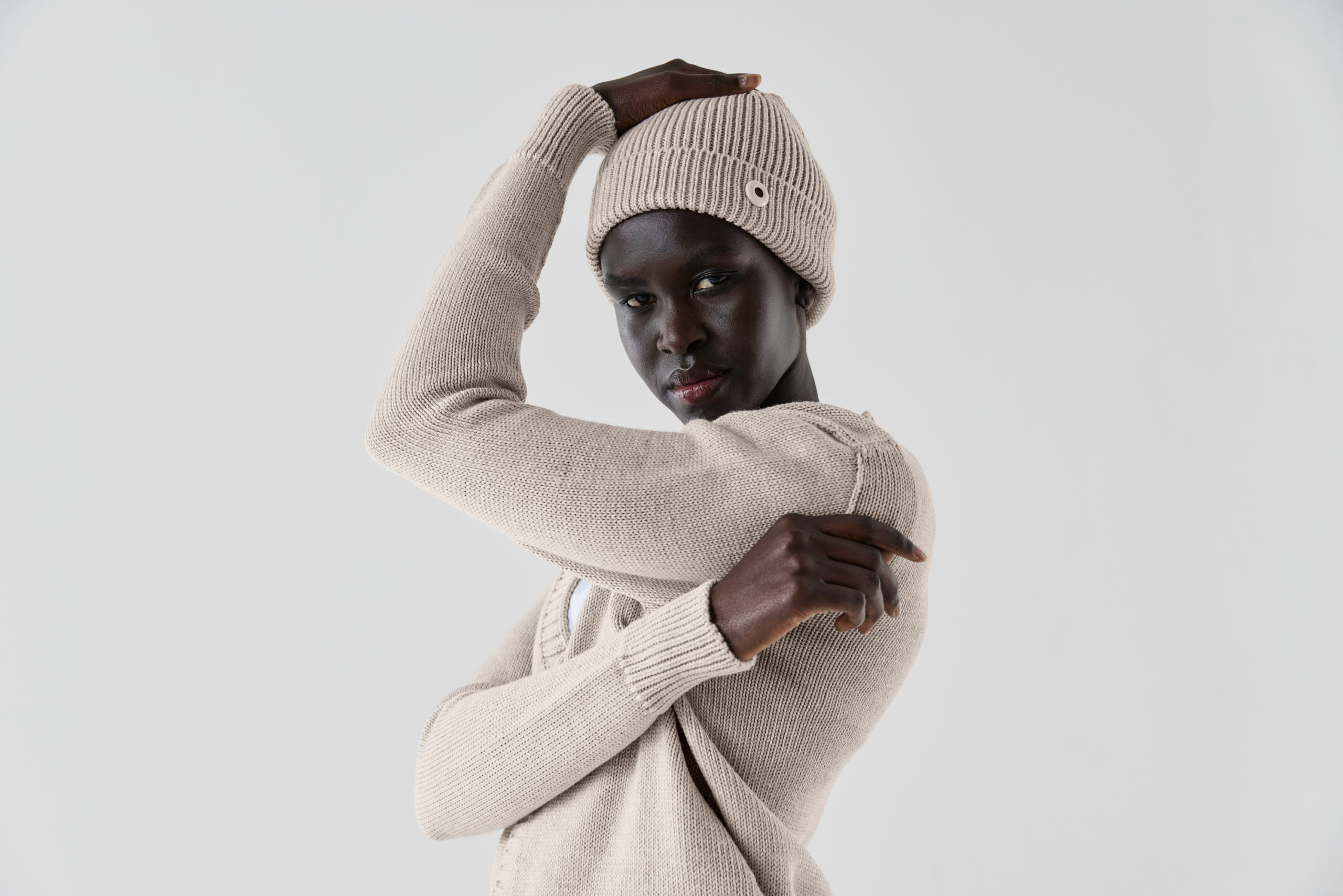
Fashion /
By drawing a direct line between the origin and the end product, the London-based knitwear brand is taking a novel approach to traceability, with the aim to ignite a deeper emotional connection to clothing. “We want people to understand that what they’re wearing comes from nature, and to remind them that it’s out there,” explains Alexander Lewis, head of design at Sheep Inc. After you buy Sheep Inc. jumper, you can adopt and name your sheep, watch it meander around a paddock and learn more about the brand’s supply chain from sheep to sweater. But how?
Every Sheep Inc. garment has a small circular NFC (near-field communication) tag attached to the bottom hem, which can be scanned using your phone. “The NFC tag is a design decision linked to the tags sheep have on their ears,” says Lewis. It’s become somewhat of a signature design detail for the brand, although the tag initially caused some confusion. “In the very beginning [October, 2019], the tags were our brand yellow, which is super bright,” says Lewis. “But we had people asking us if it was a security tag, or they thought that colour yellow meant it was hazardous in some way.” These days, though consumers are becoming increasingly familiar with tech woven into their clothing, the NFC tags tonally match the colour of the jumper, and are made from snap buttons for easy removal.
When it comes to educating consumers, NFC tags provide Sheep inc. with an opportunity to talk about their supply chains in an accessible and engaging way. It also allows the brand to explain certain sourcing decisions, like why their wool isn’t farmed closer to home. “We only use Merino wool that we source from three specific farms in New Zealand because they’re regenerative and carbon negative or neutral,” says Lewis. “There’s no farming here like there is in New Zealand, we can’t replicate that,” says Lewis. “You can see in our supply chain where the most carbon emissions come from, and it’s the farm. That’s why we have to work with farms that are regenerative, so that they’re not letting out all this Co2 without any recourse.” From New Zealand, the wool travels to Italy, where it’s spun into yarn by a mill run entirely on renewable energy, then manufactured using zero-waste knitting machines in Portugal.

“It’s not unusual to have sustainability rear its head around every thought process,” says Lewis. But does working to such strict eco-criteria feel creatively limiting? “I think you actually have more opportunity for creativity when you have strict guidelines because you have to really hunt for the solution, and you’re more creative about it,” he says. “The constraints of designing in a sustainably minded way are actually more interesting.”
Currently, the Sheep Inc. range is made up of six styles – four jumper styles, a cardigan and newly released beanie. This pared-back offering is due to the brand’s less-is-more ethos, an approach that has felt counterintuitive at times for Lewis, who has worked in the fashion industry for the better part of 15 years. “We’ve had to remind ourselves that there’s no need for us to bring out five new styles this season, we can just add one new style that adds to the collection instead of diluting it,” he says. “It’s a slower approach – if this was a fashion brand on [the fashion week] schedule, there would be more concern about getting things done on time. If something isn’t ready, we’re not going to be released, so it’s a much more sustainable approach to working.”

Since it’s inception, Sheep Inc. has been trying to create a truly genderless brand, but they’ve grappled with the complexities of garment construction. “There’s this cerebral notion of trying to create a genderless garment. At the end of the day, it ends up being a boyfriend fit, which is still gendered, so it’s a complicated space within fashion,” says Lewis. “Sizing and size inclusion is a really big frontier, and although we’re probably not going to be the ones to crack the code, or even shift the needle, it’s important for us to be hyper-aware.”
At only two years old, the brand is fast-moving and constantly looking to the future of fashion. With the potential for lab-grown leather and cotton to replace their natural counterparts on the horizon, it’s no surprise that Sheep Inc. have already started exploring the world of lab-grown alternatives to eventually replace Merino wool. “We’re discussing a shift from Sheep Included to becoming Sheep Excluded, and we’re definitely working on it,” says Lewis. “We’re looking at how to work with biopolymers and lab-grown wool, but it’s difficult to say we’re going to shift from 100 percent natural to 100 percent synthetic wool, it’d be incrementally done with blends.
Even the research and development process of making a sweater is long and drawn out, but when you start getting into something that’s at the frontier, there is so much unknown.”

From innovative new materials to traceability tech, Sheep Inc. really are at the forefront of a new wave of sustainably minded, forward-thinking fashion brands offering eco-credentials that they can back up. Lewis predicts it won’t be long before bigger brands jump on the bandwagon. “People have different visions of what qualifies as having “made it” and I think it’s when you’re knocked off by a bigger brand,” he says. “In a weird way, if a business came along and made all this fan-fare about how they were doing what we’re already doing, but as though they’re the first, that’s actually a really good feeling. It means we’ve done something right, and that’s wonderful.”